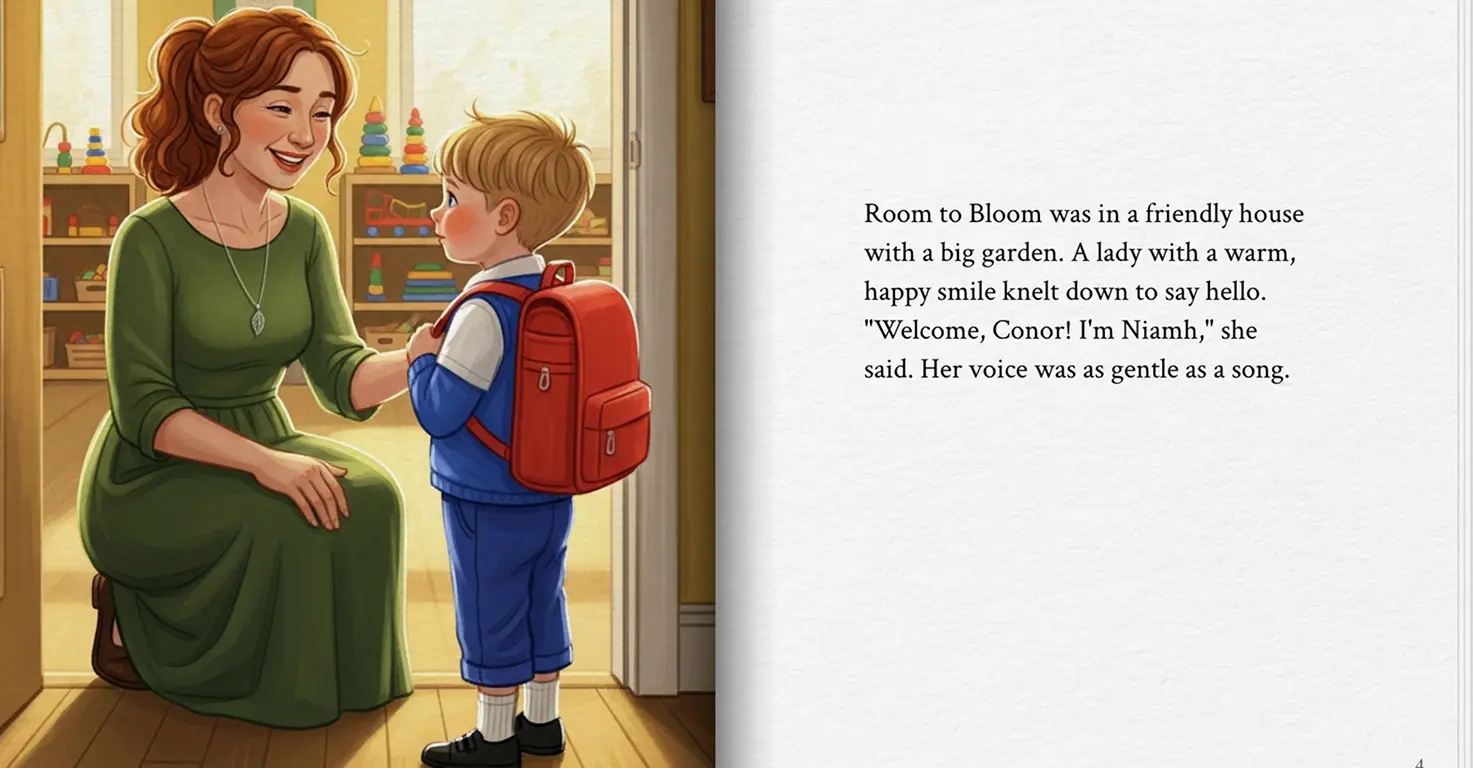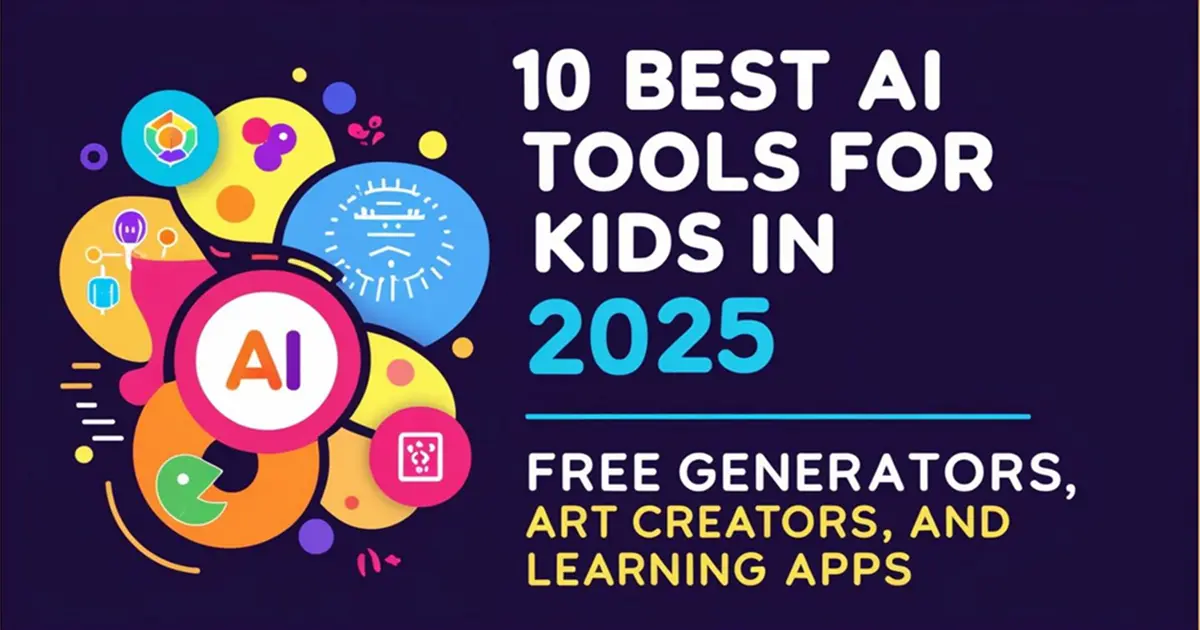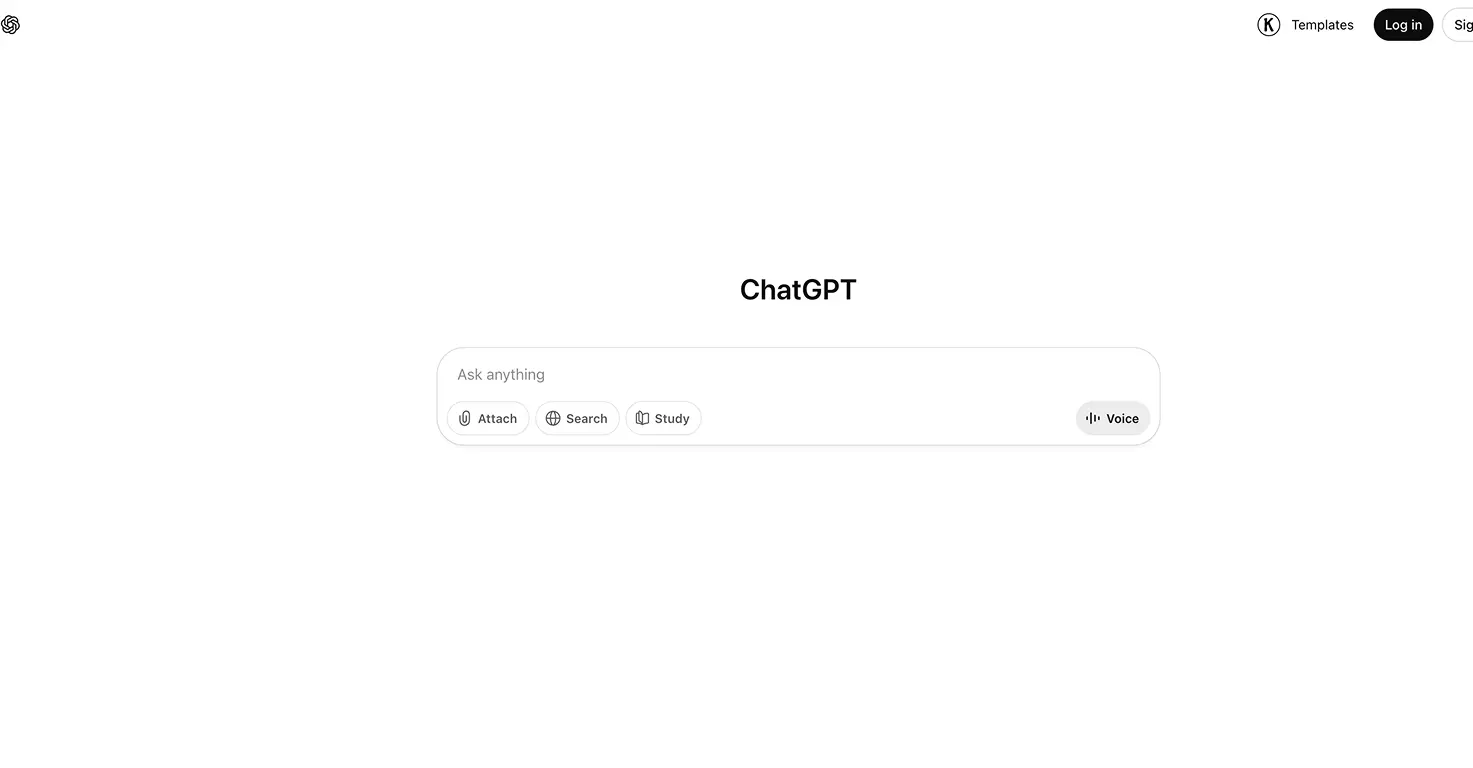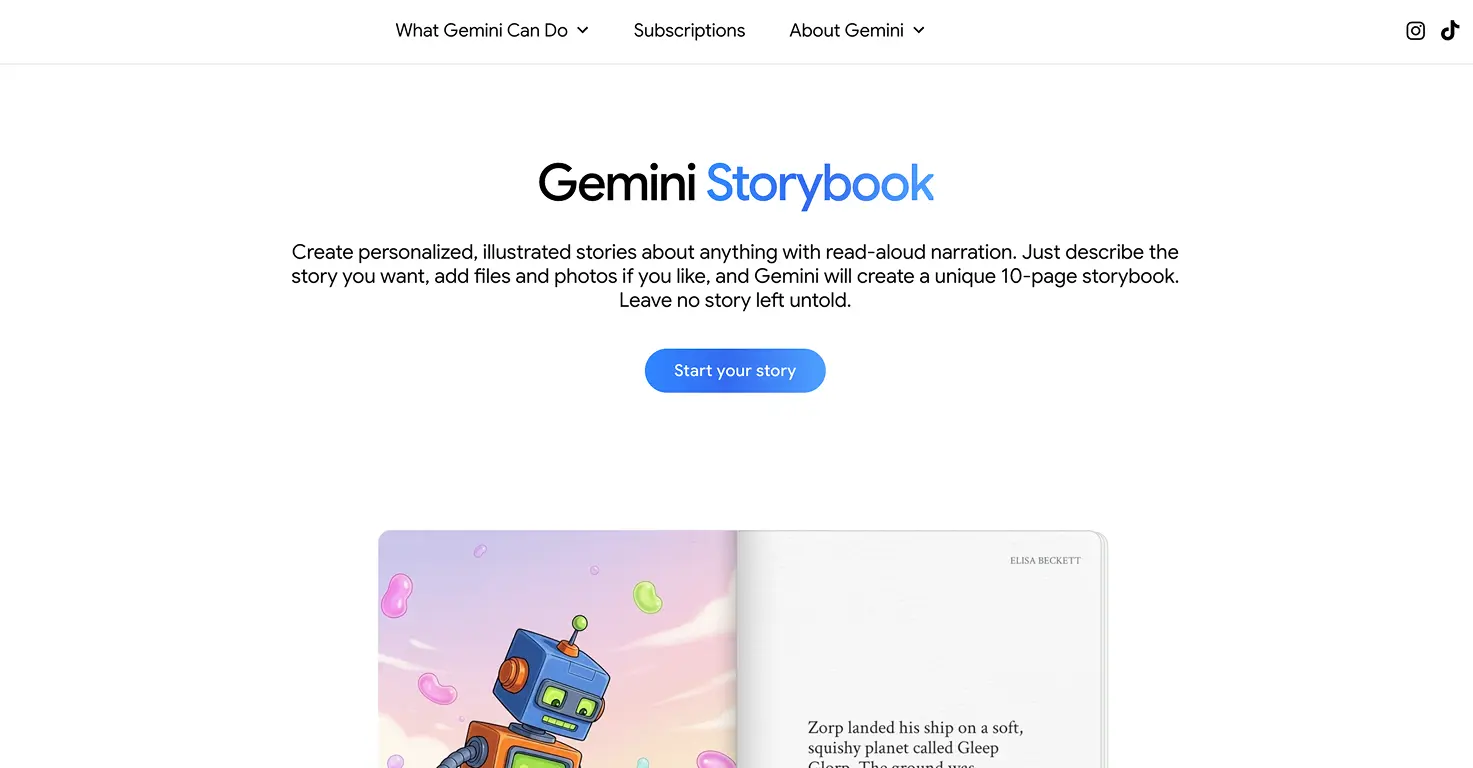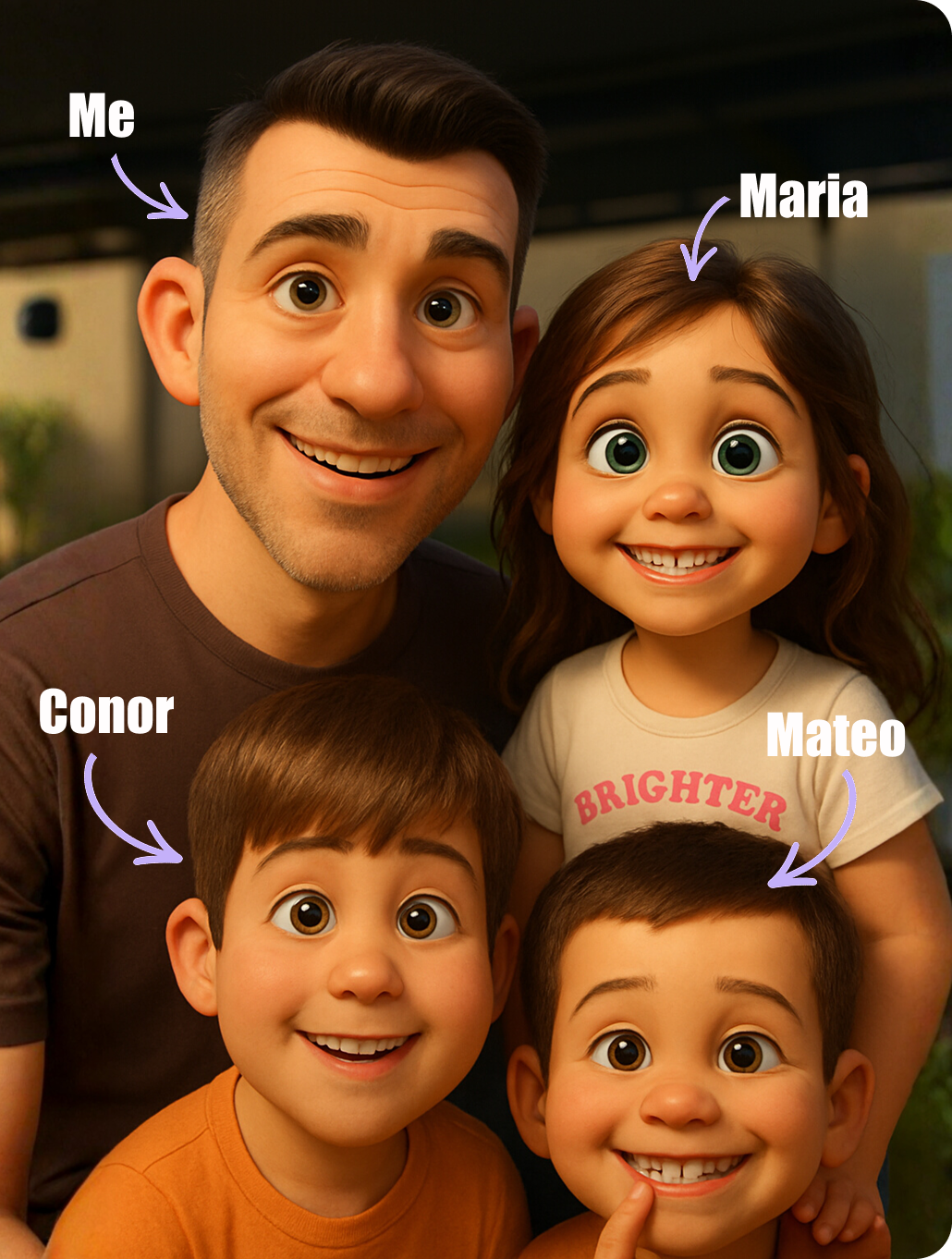ChatGPT vs. Gemini for Kids: Which AI is Safer? (2025)
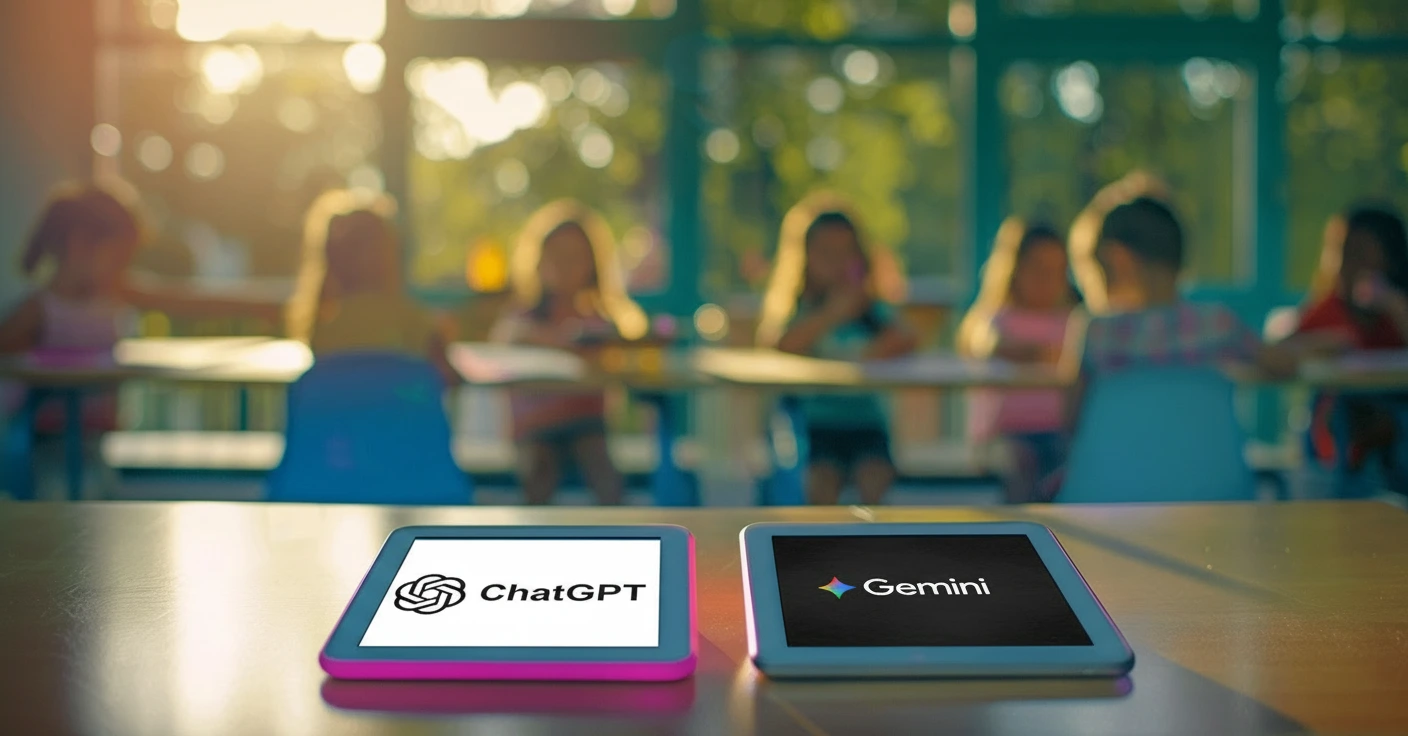
- Neither ChatGPT nor Gemini is "safe" for unsupervised use under age 13 – both require active parental involvement
- Gemini excels at visual projects and storybooks for ages 3-8, while ChatGPT is better for homework help and writing support for ages 9+
- ChatGPT has stronger content filtering but less transparency about data usage; Gemini offers better parent controls but occasionally produces less kid-friendly language
- Cost matters: Gemini's free tier is more generous, but ChatGPT Plus ($20/month) is worth it for families with older kids doing homework help
- Your child's age and primary use case matter more than which tool is "better" – we use both in our household for different purposes
Last week, a mom in my local parent Facebook group asked: "Should I let my 7-year-old use ChatGPT or Gemini?" The comments exploded with conflicting advice. Some parents swore by ChatGPT's safety features. Others said Gemini was the only responsible choice. A few said both were dangerous and to avoid AI entirely.
Here's the truth: after 8 months of testing both tools with my own kids (Conor age 3, Maria age 5, and Mateo age 8), I've learned that neither is inherently "safer" or "better." They're different tools with different strengths, designed for different use cases. The right choice depends entirely on your child's age and what you're trying to accomplish together.
In this guide, I'll share exactly how both tools performed in our real-world testing, which one excels for specific ages and activities, where each falls short, and how to decide which (or both) makes sense for your family. No marketing hype – just honest insights from a parent who's been using both almost daily.
Why We're Comparing These Two Specific Tools
ChatGPT and Gemini are the two AI chatbots most parents actually consider using with their kids. They're free (with paid upgrades), well-known, and relatively easy to access. But here's what most comparison articles miss: these tools weren't designed with kids in mind. They're consumer AI products that happen to be useful for children when supervised properly.
We tested both extensively because parents kept asking us which one to try first. Rather than guess based on marketing claims, we spent 8 months using both tools with our three kids for dozens of different activities: homework help, creative writing, story generation, learning new topics, and more.
What we found surprised us. The "better" tool depended entirely on the situation.
💡 Parent Insight: We now use both tools in our household. Gemini for creative visual projects with Conor (3) and Maria (5), ChatGPT for homework help with Mateo (8). Choosing isn't always necessary – they serve different purposes.
Quick Comparison Table: ChatGPT vs. Gemini for Kids
Before diving deep, here's how they stack up on the factors that matter most to parents:
FactorChatGPTGeminiBest Ages9-13+ (homework, writing)3-8 (visual projects, stories)Safety FeaturesStrong content filtering, less transparencyModerate filtering, better data controlsCOPPA ComplianceRequires age 13+ (often ignored)Requires age 13+ with Google accountParent ControlsLimited (account-level only)Better (Google Family Link integration)Cost (Free)Limited to GPT-3.5, sufficient for basicsGenerous free tier, includes image generationCost (Paid)$20/month for Plus (GPT-4, better responses)$19.99/month for Advanced (overkill for kids)Best ForHomework help, writing support, explanationsStorytelling, visual projects, creative promptsImage GenerationYes (ChatGPT Plus only)Yes (free tier included)Response StyleMore detailed, sometimes overly formalMore conversational, occasionally too casualOur Pick For...Ages 9+ doing schoolworkAges 3-8 doing creative projects
The short answer: If you have younger kids (3-8) focused on creative activities, start with Gemini. If you have older kids (9-13+) needing homework help, start with ChatGPT. If your kids span these ages like ours do, you'll likely end up using both.
ChatGPT for Kids: What We Learned After 8 Months
We use ChatGPT almost daily with Mateo (8) for homework help, writing projects, and learning new topics. Here's what actually works and what doesn't.
Where ChatGPT Excels
1. Homework Help and Explanations (Ages 9+)
ChatGPT is genuinely excellent at explaining concepts in kid-friendly language. When Mateo struggles with a math word problem, we paste it into ChatGPT and ask it to "explain this in simple terms for a 3rd grader."
The explanations are clear, step-by-step, and don't just give answers – they teach the process. This is where ChatGPT shines brightest in our household.
Example from our testing: Mateo was stuck on a fractions problem (adding 1/4 + 2/3). ChatGPT broke it down into finding common denominators, converting each fraction, then adding. It used pizza slice examples he could visualize. He got it within 5 minutes.
2. Writing Support and Brainstorming
For creative writing assignments, ChatGPT helps Mateo brainstorm ideas without doing the work for him. We've used it to:
- Generate story starter prompts
- Brainstorm character names and traits
- Outline story structure (beginning, middle, end)
- Suggest plot twists when he gets stuck
Critical rule: ChatGPT never writes the actual story. It suggests ideas, he decides what to use, and he writes every word himself.
3. Research Starting Points
When Mateo needs to research a topic for school (recent example: renewable energy), we use ChatGPT to generate an overview and list of questions to explore further. It's faster than aimlessly Googling and helps him understand what he's actually trying to learn.
Then he does the real research using approved websites and books. ChatGPT is the jumping-off point, not the destination.
Where ChatGPT Falls Short
1. Too Text-Heavy for Younger Kids
We tried using ChatGPT with Maria (5). It was a complete failure. The responses are walls of text with no images, which loses a kindergartener's attention in about 10 seconds.
ChatGPT is designed for people who can read fluently and process multi-paragraph responses. That's not most kids under 8.
2. Sometimes Overly Formal or Complex
Even when we ask ChatGPT to "explain like I'm 8," it sometimes uses vocabulary that's too advanced or sentence structures that confuse kids. We've learned to follow up with "simpler, please" when this happens, but it adds friction.
3. Limited Visual Creativity
ChatGPT Plus includes image generation (DALL-E), but in our testing, the images aren't great for kid projects. They're often too abstract, miss details kids requested, or look uncanny in ways that creep out younger children.
For visual projects, we consistently get better results with Gemini.
Safety Features and Concerns
What works:
- Strong content filtering that blocks inappropriate responses
- Conversation history you can review anytime
- Ability to delete specific conversations
- Doesn't proactively collect kid-specific data (because it doesn't know age)
What concerns us:
- Officially requires age 13+, but there's no verification
- No built-in parent controls or family accounts
- We don't fully understand what OpenAI does with conversation data
- Can occasionally produce factually incorrect information presented as fact
🔒 Safety Note: We never let Mateo use ChatGPT solo. One of us is always present. He can't access the account on his own devices. This is non-negotiable until he's at least 11-12.
Real Testing Example: Homework Help Success
Two weeks ago, Mateo had a writing assignment: "Describe your favorite season and why." He was stuck after writing two sentences and getting frustrated.
We opened ChatGPT together and I typed: "My 8-year-old is writing about why fall is his favorite season. Can you ask him 5 questions to help him think of more ideas?"
ChatGPT generated questions like: "What activities do you do in fall that you can't do other times of year?" and "How does fall make you feel?" and "What does fall smell like?"
He answered each question out loud, I typed his responses, and then he used those ideas to write four more paragraphs completely on his own. ChatGPT didn't write anything – it just helped him unlock ideas already in his head.
The essay turned out great, and his teacher never would've known AI was involved because Mateo wrote every single word himself. That's how we use ChatGPT for homework: idea generation and explanation, never content creation.
Gemini for Kids: What We Learned After 8 Months
Gemini (formerly Bard) is Google's AI chatbot, and we've used it extensively with all three kids, especially for creative visual projects. It's a completely different experience than ChatGPT.
Where Gemini Excels
1. Visual Storytelling and Image Generation (Ages 3-8)
This is Gemini's killer feature for young kids: free, built-in image generation that actually produces kid-appropriate results.
Our most successful project with Gemini was creating a personalized storybook about Conor's first day of preschool anxiety using Gemini Storybook. We prompted Gemini to generate a simple story, then asked it to create illustrations for each page. The images were colorful, friendly, and actually looked like something from a children's book.
We've since used Gemini to create:
- Illustrated stories about our kids as characters
- Visual learning aids (e.g., "show me what photosynthesis looks like for a 5-year-old")
- Character designs for imaginative play
- Scene illustrations for bedtime stories
For younger kids who think in pictures more than words, Gemini is dramatically better than ChatGPT.
2. More Conversational, Kid-Friendly Tone
Gemini's responses feel more casual and conversational than ChatGPT's. This works better for younger kids who aren't used to formal explanations.
When Maria asks Gemini "why is the sky blue?" the answer sounds like a patient adult explaining, not a textbook. It uses simpler sentences and more relatable examples.
3. Better Integration with Google Ecosystem
If your family already uses Google accounts, Docs, and Drive, Gemini fits seamlessly. We can generate a story in Gemini and export it directly to Google Docs for editing and printing.
This integration also means better parent controls through Google Family Link, though it requires setup.
Where Gemini Falls Short
1. Less Detailed for Homework Help
When Mateo needs help with a complex homework problem, Gemini's explanations are often too brief or miss steps. ChatGPT provides more thorough, structured explanations for academic questions.
Gemini seems optimized for quick answers and creative tasks, not deep explanations.
2. Occasionally Uses Inappropriate Language for Kids
We've had a few instances where Gemini used language that wasn't kid-appropriate – not profanity, but phrases or references too mature for young children. For example, it once described a story conflict as a character "having an existential crisis" when explaining a simple kids' story problem.
ChatGPT's content filtering seems tighter and more consistent for kid interactions.
3. Image Generation Has Limitations
While Gemini's image generation is better than ChatGPT's for kid projects, it still has frustrating limitations:
- Can't generate images of real people (so our personalized storybook couldn't show Conor's actual face, just a character that looked similar)
- Sometimes misinterprets prompts in ways that confuse kids
- Occasionally generates images with text that's gibberish or misspelled
It's good enough for most kid projects, but not perfect.
Safety Features and Concerns
What works:
- Google Family Link integration for parent controls (if you set it up)
- Activity history you can review in your Google account
- Generally good content filtering
- More transparent data policies (because it's Google)
What concerns us:
- Officially requires age 13+ with a Google account
- Occasionally produces less kid-friendly language than ChatGPT
- Image generation can produce unexpected results
- Google's data collection policies apply (search history, usage patterns, etc.)
⚠️ Privacy Note: We use a dedicated Google account for our kids' Gemini use, not our main family account. This separates their AI interactions from our personal Google data. It takes 5 minutes to set up and gives us better control.
Real Testing Example: Storybook Success
Our biggest Gemini success story was the Gemini Storybook school anxiety project we created for Conor (3) who was anxious about starting preschool.
We prompted Gemini: "Write a short story for a 3-year-old about a child who's nervous about preschool but has a great first day. Make it 4 pages long."
Gemini generated a simple, sweet story about a character who makes friends and discovers preschool is fun. Then we asked it to create an illustration for each page. The images were colorful, friendly, and perfect for a toddler.
We printed the story, added it to a simple binder, and read it with Conor every night for two weeks before preschool started. It genuinely helped reduce his anxiety because he could visualize what his day would look like.
This entire project took about 20 minutes and would've been nearly impossible with ChatGPT (no free image generation) or traditional methods (hiring an illustrator for a custom book would've cost hundreds of dollars).
Head-to-Head Testing: Same Prompts, Different Results
To give you a truly fair comparison, we tested both tools with identical prompts for three common use cases. Here's what happened.
Test 1: "Write a Story About a Dinosaur Who Loves Pizza"
Prompt (identical): "Write a short story for a 5-year-old about a dinosaur who discovers pizza for the first time. Make it fun and simple."
ChatGPT Result: Generated a 6-paragraph story with proper structure (beginning, middle, end). The language was clear and mostly age-appropriate, but a bit formal. Used vocabulary like "hesitant" and "proclaimed" that might be too advanced for some 5-year-olds. No images without paid upgrade.
Gemini Result: Generated a 4-paragraph story with simpler language and more exclamation points (which kids love). The tone was more enthusiastic and playful. Easily generated a colorful illustration of the dinosaur eating pizza when we asked. Maria preferred this version.
Winner for this use case: Gemini, especially for younger kids who want pictures.
Test 2: "Explain Photosynthesis for a 3rd Grader"
Prompt (identical): "Explain how photosynthesis works in simple terms for an 8-year-old."
ChatGPT Result: Provided a clear, step-by-step explanation using the analogy of a plant "making its own food like a kitchen." Included numbered steps and emphasized the role of sunlight, water, and carbon dioxide. Well-structured and thorough. Mateo understood it after one read.
Gemini Result: Provided a shorter explanation using similar analogies but less detail. It was easier to read quickly but Mateo had follow-up questions that required additional prompts. The explanation felt more like an overview than a complete lesson.
Winner for this use case: ChatGPT – better for homework explanations.
Test 3: "Brainstorm Ideas for a Science Fair Project"
Prompt (identical): "Suggest 5 simple science fair project ideas for a 4th grader interested in plants and nature."
ChatGPT Result: Provided 5 detailed ideas with explanations of what you'd need and what you'd learn. Each idea included a hypothesis and predicted outcome. Very thorough but maybe too much information upfront.
Gemini Result: Provided 5 creative ideas with shorter descriptions. Felt more like a brainstorming session and less like a structured plan. Mateo found it easier to scan and pick what interested him, then asked follow-up questions to flesh out the details.
Winner for this use case: Tie – depends on your kid's style. Detail-oriented kids prefer ChatGPT. Creative, big-picture kids prefer Gemini.
💡 Testing Insight: We learned that neither tool is universally "better." They have different strengths for different tasks and different ages. Our approach now: use the right tool for the job instead of trying to force one to do everything.
Safety Comparison: The Most Important Factor for Parents
Safety is where parents rightfully spend the most time worrying. After 8 months of use with both tools, here's our honest assessment.
COPPA Compliance (Spoiler: Neither is Fully Compliant)
Both ChatGPT and Gemini officially require users to be 13 or older. This is to comply with COPPA (Children's Online Privacy Protection Act), which regulates how companies collect data from kids under 13.
In practice, neither tool verifies age. You can claim to be 18 during signup and there's no verification. This means millions of kids under 13 are using both tools, often without parental knowledge.
Our approach: We don't try to hide that our kids are under 13, but we also don't create accounts in their names. We use parent-controlled accounts that our kids access only with supervision. This keeps us compliant in spirit if not technically in letter.
Content Filtering and Inappropriate Responses
ChatGPT: Strong content filtering. In 8 months of daily use, we've never encountered an inappropriate response. ChatGPT errs heavily on the side of caution and will refuse to answer questions it perceives as potentially inappropriate, even when they're innocent kid questions.
Example: Mateo asked "why do some adults drink alcohol?" for a health class assignment. ChatGPT initially refused to answer, thinking it was inappropriate. We had to rephrase as "explain alcohol for a school health project" before it would engage.
Gemini: Good but not perfect content filtering. We've had 2-3 instances where Gemini used language or references that were too mature for our younger kids – not dangerous or explicit, just not ideal for ages 3-5.
Example: When creating a story about a child nervous about school, Gemini described the character feeling "overwhelmed by existential dread." Not inappropriate, but definitely not 5-year-old language.
Winner: ChatGPT for consistent kid-appropriate responses.
Data Collection and Privacy
ChatGPT: OpenAI's privacy policy is less transparent than we'd like. They use conversations to improve their models unless you opt out (which we did immediately). We don't fully understand what data they collect or retain. This makes us uncomfortable but not uncomfortable enough to stop using it with supervision.
Gemini: Google's privacy policies are more transparent because they're already well-established for other Google services. We understand what data is collected (search history, usage patterns, account activity) and how it's used. Google Family Link also gives us more granular controls over what our kids can access.
Winner: Gemini for transparency, but both require parent oversight.
Parent Controls and Monitoring
ChatGPT: Limited controls. You can review conversation history and delete conversations, but there are no built-in parent controls, time limits, or content restrictions. All control happens at the supervision level – you must be present.
Gemini: Better controls if you set up Google Family Link. You can set time limits, review activity, and restrict certain features. It requires setup but gives more structured oversight once configured.
Winner: Gemini for families who want technical controls in addition to supervision.
Risk of AI Dependency
This is the risk most parents overlook: not that AI will show kids something inappropriate, but that kids will become dependent on AI to do their thinking for them.
We've caught Mateo trying to use ChatGPT to write entire paragraphs instead of just brainstorming ideas. We've seen Maria ask Gemini to "make it better" instead of trying to improve something herself first.
Both tools carry this risk equally. The safeguard isn't technical – it's parental involvement and clear rules about when AI helps and when kids must do work themselves.
⚠️ Critical Boundary: In our house, AI can help you understand something or give you ideas, but it can never do your work for you. We explain the difference constantly: "AI is like a tutor who explains things, not a friend who does your homework while you play video games."
Cost Comparison: Free vs. Paid Features
ChatGPT Pricing
Free (ChatGPT 3.5): Sufficient for basic homework help and brainstorming. Responses are good but not as detailed or accurate as the paid version. No image generation. No access during peak times when servers are busy.
ChatGPT Plus ($20/month): Access to GPT-4, which gives significantly better responses for complex questions. Includes DALL-E image generation (though we prefer Gemini for kid images). Priority access during busy times. We pay for this because Mateo uses it daily for homework.
Is Plus worth it? For us, yes – but only because we have an older kid doing homework help multiple times per week. If you just want occasional creative projects with younger kids, the free version is fine and you'd be better served by Gemini's free tier anyway.
Gemini Pricing
Free Tier: Surprisingly generous. Includes image generation, unlimited basic queries, and access to most features. This is what we use with Conor (3) and Maria (5) and it's more than sufficient.
Gemini Advanced ($19.99/month): Access to more powerful model, priority access, deeper Google Workspace integration. We tried it for one month and saw no meaningful difference for kid use cases. Not worth the cost for families.
Is Advanced worth it? No, not for kids. The free tier gives you everything you need.
Our Spending Recommendation
- Kids 3-8, creative focus: Gemini free tier (save $20/month)
- Kids 9-13, homework focus: ChatGPT Plus ($20/month is worth it)
- Both age ranges: ChatGPT Plus + Gemini free tier
- Just testing AI with kids: Both free tiers (costs nothing to try)
Which Should You Choose? Decision Framework
Here's how we actually decide which tool to use in our household for different scenarios.
Best for Ages 3-5: Gemini
Why: Young kids need visual content and simple language. Gemini's free image generation and conversational tone work much better for toddlers and preschoolers than ChatGPT's text-heavy responses.
Use it for:
- Personalized storybooks with illustrations
- Visual learning ("show me what a lion looks like")
- Character creation for imaginative play
- Simple explanations with pictures
Supervision level: FULL – you operate the tool entirely, child just provides ideas and enjoys results
Best for Ages 6-8: Depends on the Use Case
Creative projects: Gemini (storytelling, art, imagination)
Homework help: ChatGPT free tier (explanations, reading comprehension)
Most families with kids in this age range will end up using both for different purposes, like we do. Mateo uses ChatGPT for homework 3-4 times per week and Gemini for creative projects on weekends.
Supervision level: HIGH – you're present and involved, but child can suggest prompts and interact with guidance
Best for Ages 9-13: ChatGPT
Why: Older kids need homework help, writing support, and detailed explanations more than visual projects. ChatGPT's stronger explanatory capabilities and better homework-focused responses make it the go-to for this age range.
Use it for:
- Homework help (math, science, reading)
- Writing brainstorming and outlining
- Research starting points
- Learning new concepts
Supervision level: MODERATE – you check in regularly and review usage, but don't need to be present for every interaction
Best for Safety-Focused Parents: ChatGPT (Barely)
If your primary concern is avoiding inappropriate content, ChatGPT's stronger content filtering gives it a slight edge. But honestly, both require active parental supervision for kids under 13. Neither is "safe" for solo use.
The real safety comes from how you use these tools with your kids, not from which tool you choose.
Best for Budget-Conscious Families: Gemini Free
If you don't want to spend $20/month, Gemini's free tier offers more value than ChatGPT's free tier, especially for younger kids who benefit from image generation.
Our Family's Actual Setup
We pay for ChatGPT Plus ($20/month) because Mateo uses it for homework help 3-4 times per week. The better responses from GPT-4 are worth it for us.
We use Gemini's free tier with Conor (3) and Maria (5) for creative projects. The image generation is perfect for storybooks and learning, and we've never needed to upgrade.
Total cost: $20/month for AI support for all three kids across different ages and use cases.
What We Got Wrong (Initial Assumptions)
When we started testing both tools 8 months ago, we made some assumptions that turned out to be completely wrong.
Wrong Assumption #1: "One Tool Would Be Clearly Better"
We expected to test both and crown a winner. Instead, we learned they're tools for different jobs. Trying to force ChatGPT to create visual storybooks for a 3-year-old is like trying to hammer a nail with a screwdriver – wrong tool for the task.
Now we think of them as complementary, not competing.
Wrong Assumption #2: "Paid Versions Would Be Way Better for Kids"
We tried ChatGPT Plus and Gemini Advanced, assuming the paid versions would be dramatically better for kid use cases.
Reality: ChatGPT Plus is worth it for homework help with older kids (9+), but Gemini Advanced offered no meaningful advantage for any age. Most families can stick with free tiers and be perfectly happy.
Wrong Assumption #3: "Technical Safety Features Matter Most"
We spent weeks researching content filters, data policies, and technical safeguards before letting our kids try either tool.
What we learned: the biggest safety factor is parental involvement, not technical features. Our clear rules, consistent supervision, and regular check-ins matter infinitely more than which tool has slightly better content filtering.
Both tools are reasonably safe with active parent involvement. Neither is safe without it.
Wrong Assumption #4: "Kids Would Prefer the 'Smarter' Tool"
We assumed kids would naturally gravitate toward whichever tool gave better, more detailed responses.
Nope. Maria prefers Gemini because it makes pictures. Mateo prefers ChatGPT because "it explains things better." Kids care about whichever tool solves their immediate problem, not about which one is theoretically more advanced.
The Bottom Line
After 8 months of daily testing with three kids across different ages, here's what we'd tell a friend asking which to try:
Start with your child's age and primary use case:
- Ages 3-5, creative projects: Gemini free tier
- Ages 6-8, mixed use: Try both free tiers, see which clicks
- Ages 9-13, homework help: ChatGPT Plus ($20/month)
Both tools require active parent involvement for kids under 13. Don't rely on technical safety features to do the parenting for you. Set clear rules, supervise usage, and check in regularly.
You don't have to choose just one. We use both in our household for different purposes and different ages. They complement each other well.
Start free. Both offer generous free tiers that are perfect for testing. Spend a month trying both before paying for anything. You'll quickly figure out which fits your family's needs.
Want to dive deeper? Read our full safety reviews of ChatGPT and Gemini Storybook, including setup instructions, parent controls, and detailed testing results.
And if you're ready to try a safe first project, check out our Gemini Storybook school anxiety project guide or our Best AI Tools for Kids 2025 guide for more options beyond these two.
The right AI tool isn't the one with the best features – it's the one you'll actually use consistently with proper supervision. That matters more than anything else.
Not sure which tool is right for your child?
Take our free 2-minute quiz and get personalized AI tool recommendations based on your child's age and interests.



